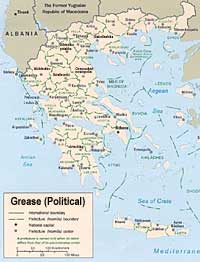![]()
![]()
If you enjoy this site, please check out mamster's new weblog, Roots and Grubs.
The Colossus of Roast
by Emily Short
October 22, 2000
 Click the above map to zoom in on Greece's culinary landscape. |
I've always been a fan of Greek food, so when I had an opportunity to spend a year studying in Athens, one thing I looked forward to was the chance to sample a lot of authentic restaurants. And I was going to be traveling a good deal, so I'd get to check out the offerings in all sorts of other parts of Greece as well. Moussaka. Spanakopita. Baklava...
Except here's the thing. Food at Greek restaurants in America is adjusted for the American palate in all kinds of subtle ways. The menu is more varied. More heart-friendly. Less reliant on the Slab o' Meat as its basic unit.
In many Greek restaurants, the chief kind of entree available is just that, cooked hard and dark by someone with a grudge. It arrives in a little puddle of grease and surrounded by French fries. To give credit where it's due, some of the very best French fries in the world seem to come out of Greek kitchens, but I'm still not willing to eat them at every meal. And as for the meat, it's often unspeakable, an unidentifiable mess of bones and gristle, the sort of thing to make a vegetarian wag his finger and say, "I told you so." Whether it claims to come from a cow or a pig or a lamb is pretty much irrelevant at that advanced stage of charcoalization. (Many Greek menus are translated into English as a matter of course; due to a chance trick of phonics, the latter kind of meat is frequently referred to as "lamp," as in "lamp chops.")
There are some exceptions, of course, but they are most often to be found in restaurants where the menu is spoken rather than printed and you'll need an interpreter to help you figure out what the proprietor's daughter has just said. I had a superb dish of chicken with mushrooms in Corinth, and, believe it or not, some quite edible goat meat in Crete. And at the other end of the spectrum there are restaurants like the Agora in Athens, near the American Embassy: the waitresses speak near-flawless English, the chef seems to have spent some time in France, and the cappuccino could almost be Italian. But on the whole, the Slab o' Meat rule holds good for any restaurant that you're likely to walk into at the end of a grueling day seeing the sights.
This is all the more disappointing because Greek appetizers are so good. Eggplant salad, thick and well-seasoned. Fish-egg salad, a pale pink salty paste that goes on bread. Sliced octopus in vinegar, served cold but not tough or rubbery. Balls of sausage surprisingly flavored with mint. Dolmades, stuffed vine leaves. Gigantes, huge beans in a thin savory sauce. Tzatziki, made chiefly of garlic and of a yogurt so thick it acts like sour cream. Saganaki, a slab of fried cheese served with a piece of lemon or lime: the juice is necessary to balance the greasy saltiness. Choriatiki, "country salad," which is on every menu everywhere, made of chunks of tomato and cucumber, rings of onion, a big square slab of feta, a healthy handful of kalamata olives, and a drizzle of olive oil over the top.
Many of these appetizers are available in the average Greek restaurant in the States, but the tzatziki never has the right texture and the Greek salad seems too formal. (Hint: you're supposed to end up with a little heap of olive pits on your plate.) Besides, restaurants in the States lack that authentic ambience: the warm night air, the view of the Mediterranean, the slap of waves on the harbor wall. The Greek pop drifting out of a nearby establishment. The slow waitstaff, the cigarette smoke, and the little kid who tugs at your elbow trying to sell you a packet of Kleenex for a few hundred drachmas....
So if you find yourself eating out in Greece, go with a friend and order at
least half the contents of the appetizer menu. Ignore the entrees. Keep demanding
that the waiter bring more bread. You'll find there's enough substance and variety
to make an excellent meal without any reliance on lamp meat.![]()
Emily Short is a Classics Ph.D. student and a victim of incurable wanderlust.